-
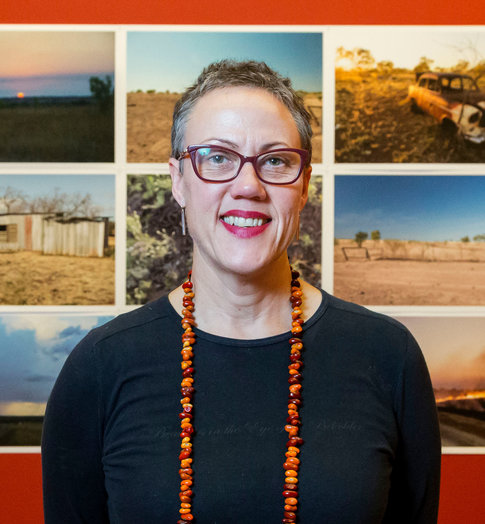
Professor Brenda L Croft solo exhibition “Naabámi (thou shall / will see): Barangaroo (army of me)”
Congratulations to one of our collaborating scholars Professor Brenda L Croft for her recent launch of her solo exhibition “Naabámi (thou shall / will see): Barangaroo (army of me)” on July 9th at the Australian Embassy, Washington DC. The exhibition features a series of large-scale photographic portraits of contemporary Australian First Nations women and girls with cultural connections across Australia.
-
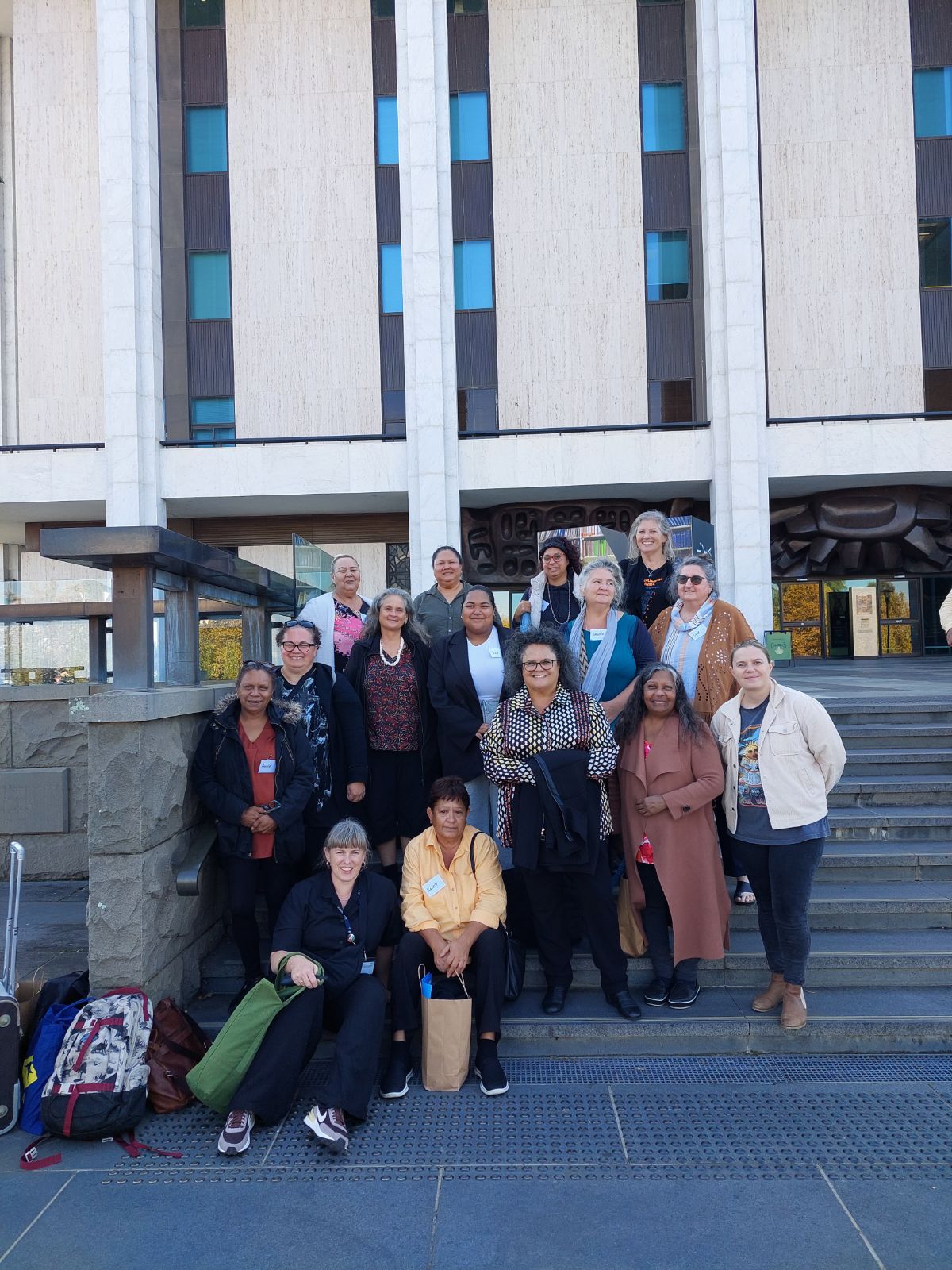
RCDH Indigenous Family Research and Writing Skills Workshop
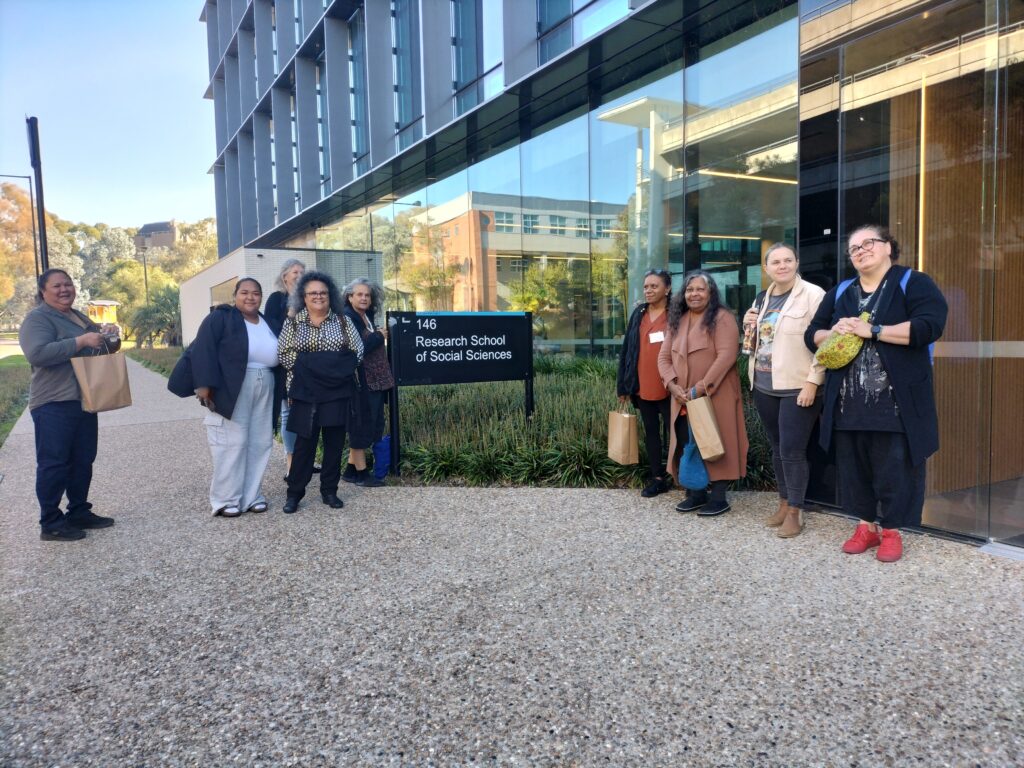
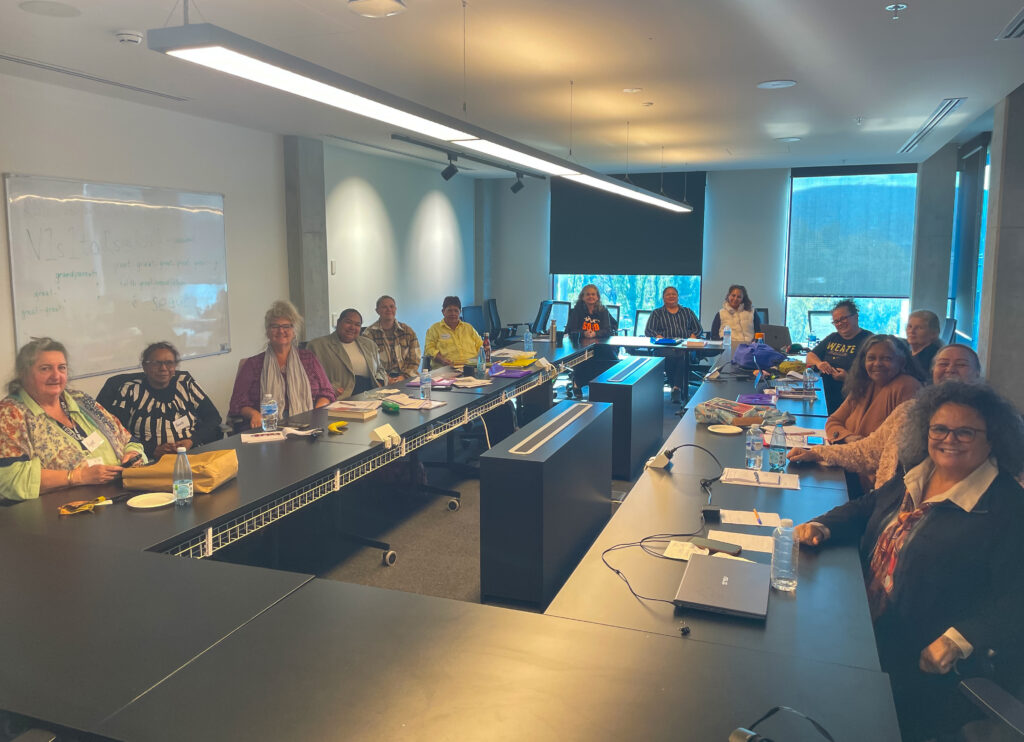
Last month, the Research Centre for Deep History welcomed a group of fourteen Indigenous women to the first RCDH Indigenous Family Research and Writing Skills Workshop. Following a highly competitive application process, fourteen participants were selected to travel to ANU from various places – including Adelaide, Bateman’s Bay, Weipa, Ulladulla, Mackay, Melbourne, Newcastle, Coolangatta and Coffs Harbour.
After arriving in Canberra, participants visited the RSSS Building and met their roommates for the workshop, followed by a welcome dinner hosted by the RCDH. The main program for the two-day workshop was designed and delivered by ANU alumni Dr Shauna Bostock. Featuring sessions on how to locate and use birth, death and marriage certificate and to construct a family tree, Shauna’s program drew on her experiences of conducting her own family research for her doctoral research project, developed into her successful book, Reaching Through Time: Finding My Family’s Stories, published in 2023 by Allen and Unwin. The afternoon of the first day of the program saw a trip to the National Library Australia, where the workshop group was greeted on the steps by the NLA’s Indigenous Engagement team. Participants enjoyed a session on searching Trove, visiting the Special Collections Reading Room, and learning more about the NLA’s collections and how to access them.
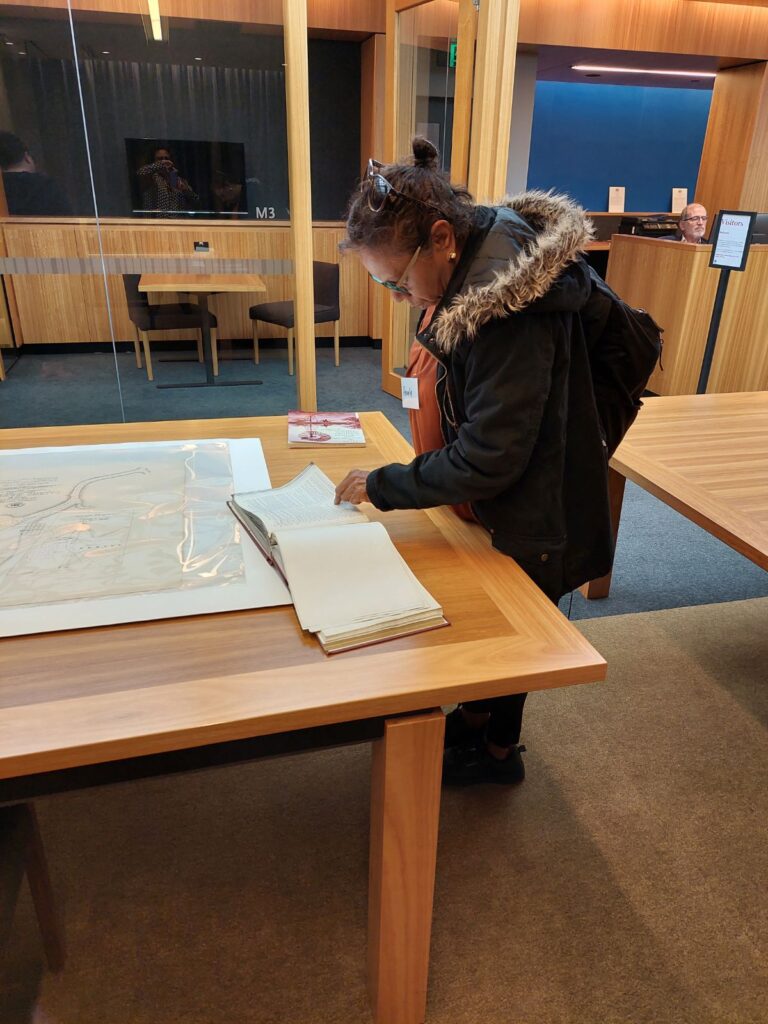
Pearla in the Special Collections Reading Room 
The workshop participants arriving at the NLA The second day of the program kicked off with a session delivered by the Family History Unit from the Australian Institute for Aboriginal and Torres Strait Islander Studies. This session, led by AIATSIS Family History Unit Assistant Direct Steph Williams, showcased the historical archives and the family history research resources available at AIATSIS. Next, the program covered historical writing skills, including how to write about relationships to relatives, and the differences between nonfiction narrative and academic writing. The workshop wrapped up with a yarning circle and reflections on the workshop program, including discussions about future research directions for the participants.
The participants generously shared constructive feedback. One of the main requests was for the workshop to be longer, and to run again. We have heard from many applicants who were unable to attend this workshop; there is such strong demand for more workshops of this kind.
Extracts from the feedback:
‘Meeting new friends and hearing unique stories.’
‘Everyone sharing and being so generous with their knowledge, and feeling supported and safe through accommodation, cultural safety and food.’
‘Sitting with like-minded women, and the opportunity to ask questions– no judgment, just assistance.’
‘It was very relevant information and resonated with me, my needs and my thoughts.’
‘Can’t express my gratitude of doing this or how important it is.’
‘Listening to each other’s journey.’
‘The workshop has given me confidence to continue my research.’
‘Every part of this workshop was amazing.’

‘I would highly recommend this course to other Indigenous women as it not only helped with writing and family history knowledge, but also with my sense of worth and abilities.’
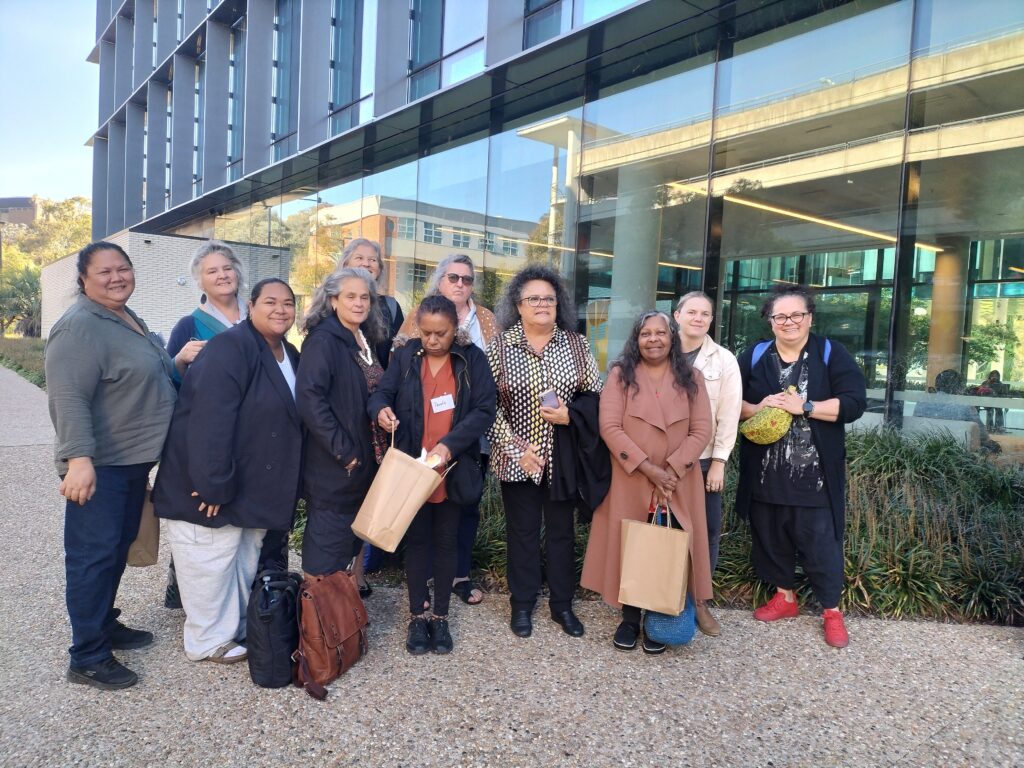
‘It was very relevant information and resonated with me, my needs and my thoughts.’
‘Can’t express my gratitude of doing this or how important it is.’ ‘Listening to each other’s journey.’
‘The workshop has given me confidence to continue my research.’
‘Every part of this workshop was amazing.’
‘I would highly recommend this course to other Indigenous women as it not only helped with writing and family history knowledge, but also with my sense of worth and abilities.’
-
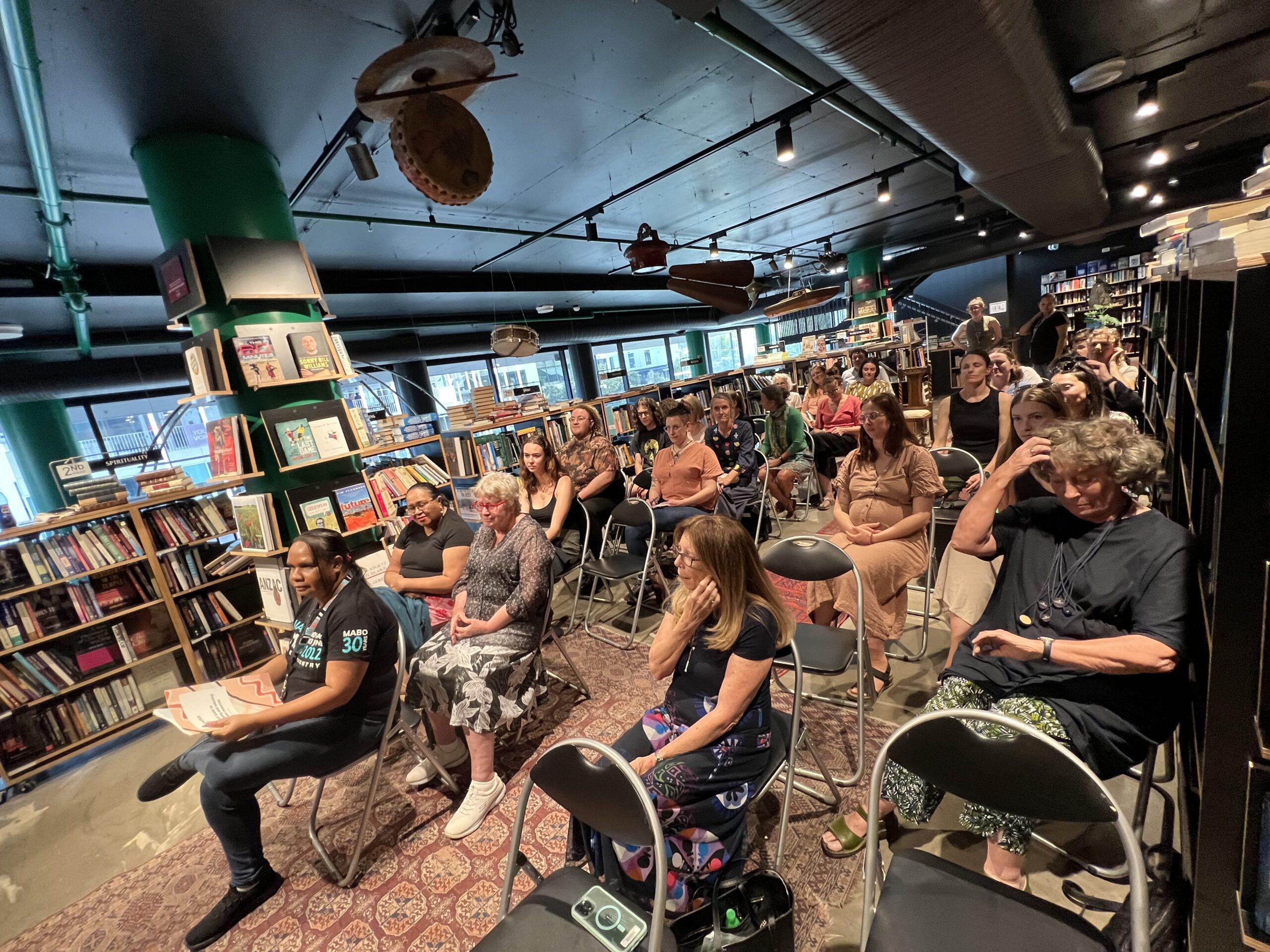
In My Blood It Runs Book Launch + Discussion
On 7 March, the Research Centre for Deep History, in collaboration with the AIATSIS Education team, hosted a launch and discussion of the new children’s book by authors Dujuan Hoosan, Margaret Anderson and Carol Turner, In My Blood It Runs, at the Harry Hartog bookstore at ANU. The book is based on the award-winning 2019 observational documentary film, In My Blood It Runs , directed by Maya Newell. It tells the story of Dujuan Hoosan, a 10-year-old Arrernte and Garawa boy. A wise, funny, cheeky boy, Dujuan is in trouble at school – where the teachers say he is failing and in danger of expulsion – and in town with the police, who say he is at risk of being locked up.


The event was well attended by an engaged and interested crowd of students, school teachers academics and educators, and was MCd by Sara Tomkins, Acting Director of AIATSIS Education. The launch commenced with a Welcome to Country from Selina Walker. Attendees next heard from Dujuan Hoosan in a pre-recorded clip at the book’s launch in Mparntwe, where he spoke about his motivations for writing the books, and his hopes for the impact it might have on children and policy-makers alike.


Angie Hastie, member of the AIATSIS education team, spoke about the team’s new learning resources produced for curriculum areas Humanities and Social Sciences: Civic and Citizenship; Heath and Physical Education: Identities and change; English: Literature and the Aboriginal and Torres Strait Islander Histories and Cultures Cross-curriculum Priorities. The team made available hard copies at the launch– all of which were snapped up– along with supporting materials to support teachers. The resource based on In My Blood it Runs is now available via the AIATSIS website here.
Eli Archer, a teacher educator at University of Canberra, Steph Isbester, education consultant at NIYEC, and Dan Greene, assistant director of AIATSIS education, took part in a panel discussion facilitated by Beth Marsden. Panelists reflected on what resonated with them in the book, their advice to educators to support Aboriginal and Torres Strait Islander students to feel strong in their identities, and how schools can better recognise and celebrate the knowledge Aboriginal and Torres Strait Islander students bring with them to school. The audience continued the discussion about self-determination, schooling and learning for Indigenous students over refreshments.
A huge thank you to Sara Tomkins, Rach Armstrong, Angie Hastie and Eleni Serras from AIATSIS Education for all their work towards the event, to AIATSIS for co-sponsoring the event alongside the Research Centre for Deep History, and to Katherine Aigner for the fantastic photos.















-

Indigenous Family Research & Writing Skills Workshop 16-17 April 2024 at ANU
Call for Expressions of Interest
We are seeking expressions of interest to take part in an Indigenous Family Research & Writing Skills Workshop.
This is for Indigenous women interested in building their skills in family history research and writing, who may be thinking about or who have already started on their research journey. Participants can be enrolled in any level of tertiary course, or considering enrolling at university. No specific academic qualifications are required. This workshop is open to participants living anywhere in Australia.
This workshop, for 10-14 participants, will be designed and facilitated by Indigenous family historian and RCDH collaborating scholar Dr Shauna Bostock.
The workshop will be held in the Research School for Social Sciences at ANU and include a visit to the National Library of Australia. See full details below.
Applications due 22 March 2024.
-
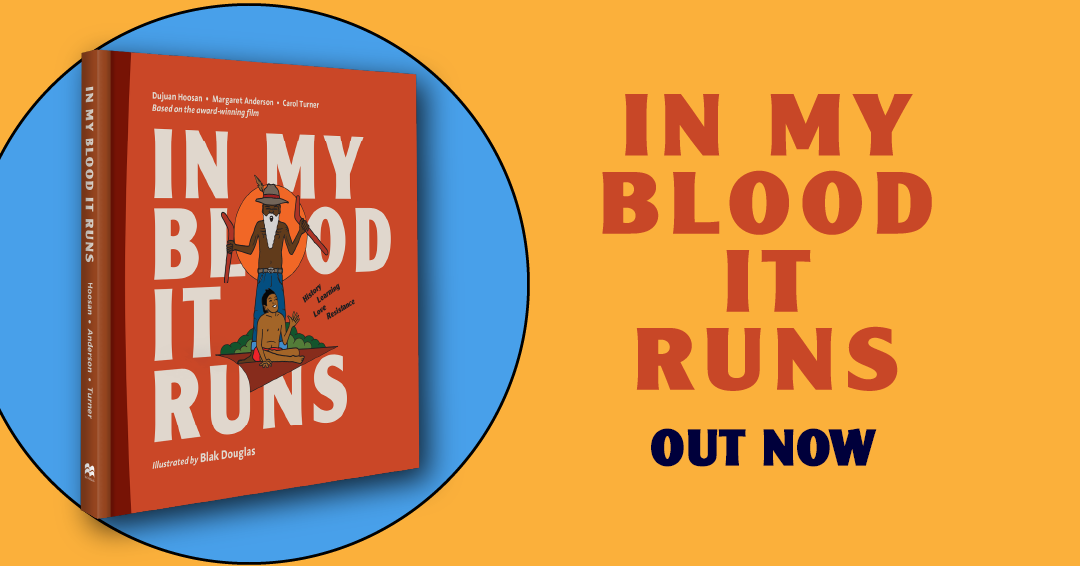
History. Learning. Love. Resistance. In My Blood It Runs book launch, Thursday 7 March at 5pm
In collaboration with AIATSIS Education, the Research Centre for Deep History is pleased to share this invitation to the ANU launch of new children’s book, In My Blood It Runs, written by Dujuan Hoosan, Margaret Anderson and Carol Turner, with illustrations by Blak Douglas. The book is based on the documentary of the same name, and continues the argument for self-determined education, and reform of school and juvenile justice systems and education policy.
These issues will be explored through a discussion with speakers including:
Steph Isbester, Educational Consultant, NIYEC (National Indigenous Youth Education Coalition)
Dan Greene, Assistant Director of Education, AIATSIS Education
Eli Archer, Lecturer in Teacher Education, University of Canberra
Please register via this link. We look forward to seeing you there!

-
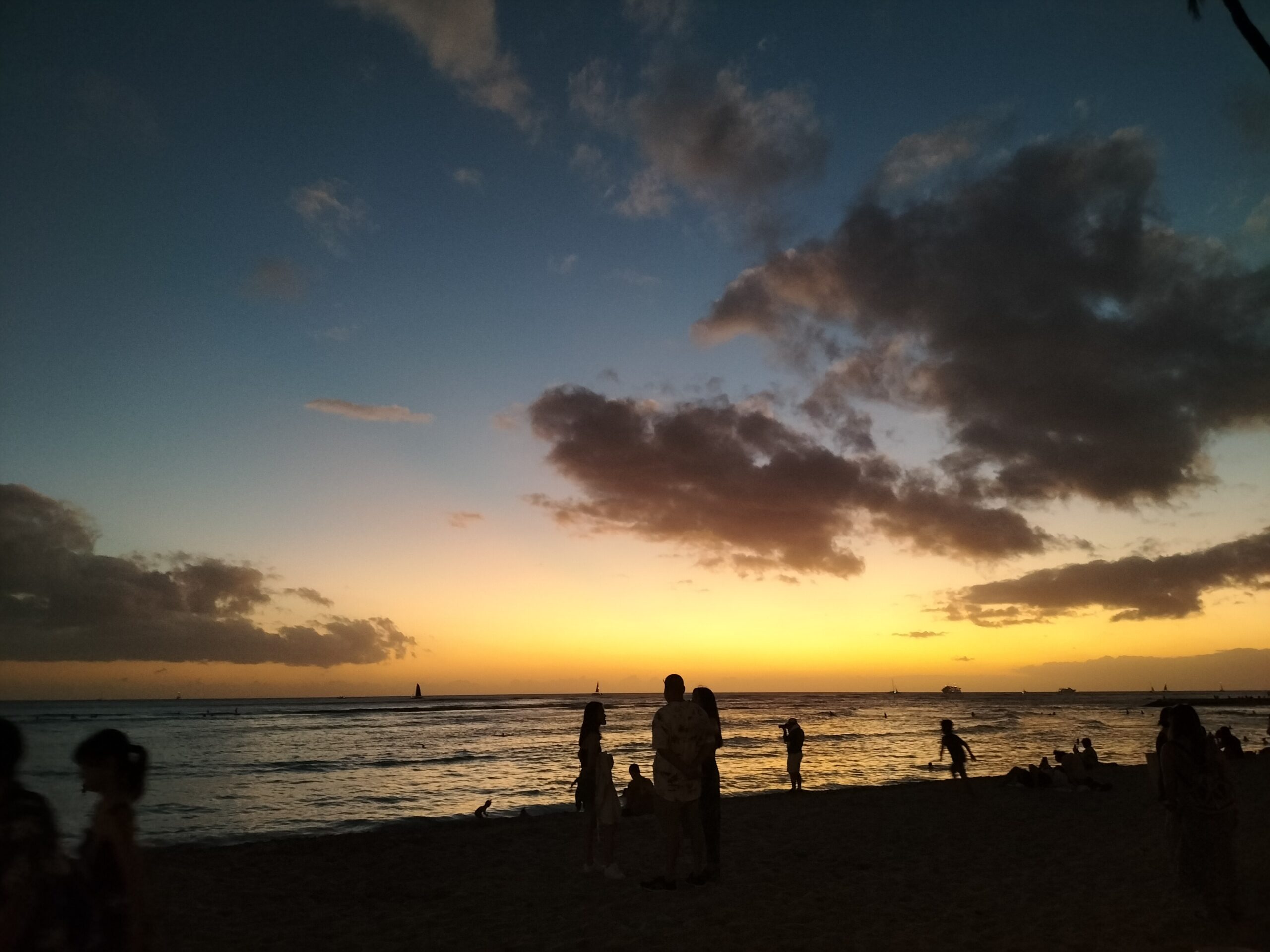
Research Centre for Deep History visits Hawai’i for the 4S Conference: Sea, Sky and Land: Engaging in Solidarity in Endangered Ecologies
In early November, members and affiliated researchers of the Research Centre for Deep History (RCDH ) travelled to Honolulu, Hawai’i for the Society for Social Studies of Science Annual Conference. The theme for the 2024 meeting was Sea, Sky and Land: Engaging in Solidarity in Endangered Ecologies.
A three-panel symposium on ‘Deep History, Temporality and Indigenous Sovereignty’ was convened by RCDH Director Ann McGrath and Senior Advisor Jackie Huggins. The panels featured papers from Anna Clark, Beth Marsden, Bhaveeka Madagammana, Ann McGrath, Jackie Huggins, Bronwen Neil, Chris Urwin and Lynette Russell, Grace Fletcher, Laura Rademaker and Joakin Goldhahn, Martin Porr, Mary Blight and Neil Brougham.
Showcasing diverse but interconnected research, presenters spoke to themes spanning methodological and ethical approaches to deep history, time and temporality, and reflected on the foundational concept of Indigenous sovereignty. The recent outcome of the Voice to parliament referendum lent an urgency to the lively discussions that followed each panel.

L- R Chris Urwin, Neil Brougham, Grace Flethcer, Bhaveeka Madagammana, Bronwen Neil. Jacki Huggins, Ann McGrath, Anna Clark, Beth Marsden at the Honolulu Convention Centre. 

Jackie and Anna and Laura, Beth, Martin and Mary. Three keynotes from Native Hawaiian scholars and activists were a highlight of the program. First, Professor Kamanamaikalani Beamer, spoke about the centrality of water justice and sovereignty to Native Hawaiian resistance to US militarisation, including the role of the US military in the contamination of water at Red Hill. The second, a plenary on, ‘Aloha ‘Āina: Hawaiian Knowledge Today,’ explored the concept of aloha āina: taking care of land through conversation Presenters included Manulani Aluli Meyer, theorist of Indigenous epistemology, Mehana Blaich Vaughan, researcher of Indigenous natural resources management, and Malia Akutagawa, whose work has focused on protecting Indigenous resource rights. Their discussion threaded the historical through the contemporary using the framework of ‘āina’ —often translated as ‘land’ but more accurately meaning ‘that which feeds’—as that which underpins ethical relationships between humans, knowledge frameworks, and land. Aluli and Blaich encouraged seeking out the knowledge of place by engaging with place names and other forms of Indigenous knowledges, to create a shared purpose for Indigenous and non-Indigenous peoples to care for the land and preserve the knowledges of it. Presenters spoke about the destructive forces of colonialism and militarism on Hawai’i whilst asserting that out of this destruction comes creation. This was a poignant reflection in light of Australia’s recent referendum sparked by Jackie Huggins.

Stephanie Gilbert, Manulani Aluli Meyer and Jackie Huggins following the plenary ‘Aloha ‘Āina: Hawaiian Knowledge Today.’ The third keynote, ‘On Fantasies, Broken Things and the redistribution of epistemic authority’, also examined contests over resources and environmental and epistemic justice. Bruce Ka`imi Watson, Aurora Kagawa-Viviani, and Kyle Kahihiro explored the intersections of knowledge, ignorance, colonialism, and militarism including discussion of the devastating recent wildfires in Maui, an event inextricably connected to the historical and contemporary issues raised across all three panels. Pointing to the devastating impacts of the drought and winds that culminated in the Maui fires, Watson, Kajihiro and Kagawa-Viviani contrasted the destruction of the fires with sweeping images of endless infinity pools asking “whose fantasies” do the uses of water serve?
All speakers also reminded conference delegates of the continuity of Hawai’in sovereignty and the impact of occupation, militarisation and over-tourism. We learned that the tourist and defence industries have a disproportionate negative impact on Hawai’in people and natural resources, while economic benefits are unevenly distributed. Each of the keynote addresses centred Indigenous epistemologies and ontologies, consistently returning to Indigenous water and food sovereignty, and threading through the historical contexts underpinning the contemporary situation in Hawaii.


The second and third presidential plenaries: ‘Aloha ‘Āina: Hawaiian Knowledge Today’ and ‘On Fantasies, Broken Things and the redistribution of epistemic authority.’ What we learned through these keynotes underscored our experiences in Hawai’I beyond the convention centre and conference program. On Thursday, Jackie, Grace, Anna, Ann and Beth visited the Bishop Museum. ANU scholar Katerina Teaiwa’s exhibition, Project Banaba, was on display, comprising historical archives and multimedia works illustrating the networks linking the extraction of phosphate from Banaba to global agricultural interests. The museum houses the world’s largest collection of Hawaiian and Pacific artefacts including an extensive display of everyday farming and fishing tools, of ceremonial dress, items owned by the Hawaiian royal families, as well as displays of the Hawaiian Renaissance Movement in the 1970s.


Grace, Beth, Jackie and Ann at the Bishop Museum. On the final day of the conference, Anna, Ann, Grace and Beth participated in a half-day session at the Hamakua Marsh, where we engaged in revegetation work to support the regeneration of the wetlands. A tour of the marsh showed the impact of the drought Hawaii is currently experiencing, yet we were fortunate enough to see a number of waterbirds at the site. This was part of the 4S conference program’s ‘Making Doing Session’, in which research was enacted or tested, or theories applied in experiential ways.
By Beth Marsden and Grace Fletcher



L-R: Conference delegates at the Hamakua Marsh, Ann in front of a Pono wiliwili tree, Beth, Grace and Anna on the road to Hamakua Marsh. 

Sunsets at Ala Moana Regional Park and Waikīkī Beach. -
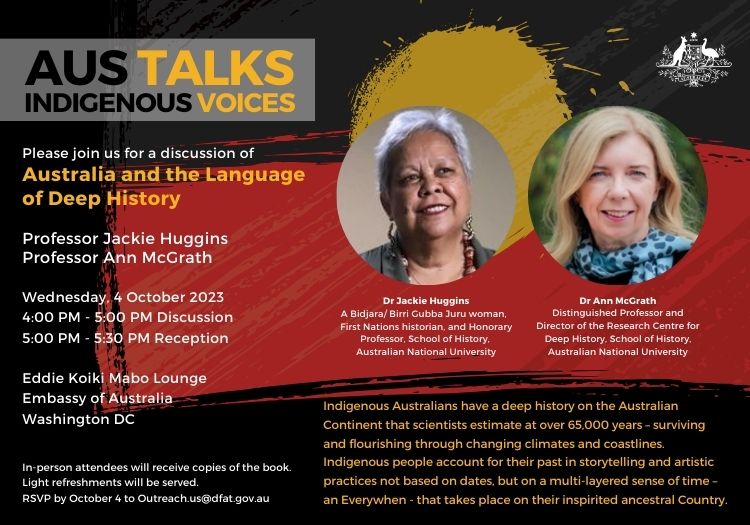
Australia and the Language of Deep History at the Australian Embassy, Washington DC
ARC Laureate Fellow and Centre Director Professor Ann McGrath and Bidjara/Birri Gubba Juru woman, Honorary Professor and Senior Advisor at the Centre Professor Jackie Huggins will speak about the aims and outcomes of this nationally significant project on Australia’s deep human past. They will demonstrate some of the riches in the Marking Country website, a repository of living deep histories of the Australian continent, that showcases rock art, plant uses, ancient stories, and a current-day ceremony for babies – all told directly by Indigenous Australians. The new book, Everywhen: Australia and the Language of Deep History edited by Ann McGrath, Laura Rademaker and Jakelin Troy (University of Nebraska Press and New South Press) will also be featured.
In recognition of Indigenous Peoples’ Day (9 October), The Embassy of Australia in Washington DC invites you to a virtual AusTalk on Australia and the Language of Deep History
Date and time
Wednesday, October 4, 2023 shortly after 4:00 PM (UTC-04:00) Eastern Time (US & Canada)
Thursday, October 5, 2023 at 7:00AM (UTC+11:00) Australian Eastern Daylight Time (Australia)
Zoom link
Join link:
https://dfat.webex.com/dfat/j.php?MTID=mb99218b06c69005d189fa3fab60355cb
Webinar number:
2653 266 3489
Webinar password:
ifAACtRd333 (43222873 from phones and video systems)
Join by phone
+61-2-9338-2221 Australia Toll
Access code: 265 326 63489
-

Taragara Aboriginal Corporation visit to the Research Centre for Deep History
On Tuesday, 16 May the Research Centre for Deep History hosted Dr Lorina Barker (University of New England and Deputy Chair of the Centre’s Indigenous Advisory Committee) and members of the Taragara Aboriginal Corporation’s team for a symposium designed to share research and ideas. The workshop provided an important opportunity for the Centre to engage with Indigenous knowledge holders to discuss research and questions around archives, stories, and the importance of Deep History.
Attending the symposium were community members from Bourke, Dubbo, and Armidale, including Uncle Rick Elwood, Aunty Gwen Barker, Aunty Elva Barker and Phillipa Trelford with young community members Leroy, Lacey, Peta, Jerone and Maddison. Also participating in the session was Jennifer Bird, RCDH project manager, Ben Silverstein, PhD student Neil Brougham, and post-doctoral research fellow Beth Marsden.
Following introductions and morning tea, Research Centre Director Ann McGrath shared an overview of the Marking Country Project, including the project aims and ways of working with communities. Ann presented some of the work completed for the Marking Country website, including the ‘Walking Deep History: Carnarvon Gorge’ project, led by Bidjara Elders Uncle Fred ‘Cotto’ Conway and Professor Jackie Huggins, with RCDH Member Amy Way. Ben discussed the collaborative work produced by the Yawuru storytellers, and RCDH Member Mike Jones.
Following lunch, Lorina led a discussion of the Taragara Aboriginal Corporation’s recent projects in the fields of arts, research and culture. This included Songlines of Country, Weaving Workshops and Mura Maarni: Chasing Mob through the Archives. You can read more about Taragara’s work here.
The symposium concluded with an open discussion about the importance of questioning the legitimacy of colonial approaches to research processes and sources.
Ann McGrath and Lorina Barker -
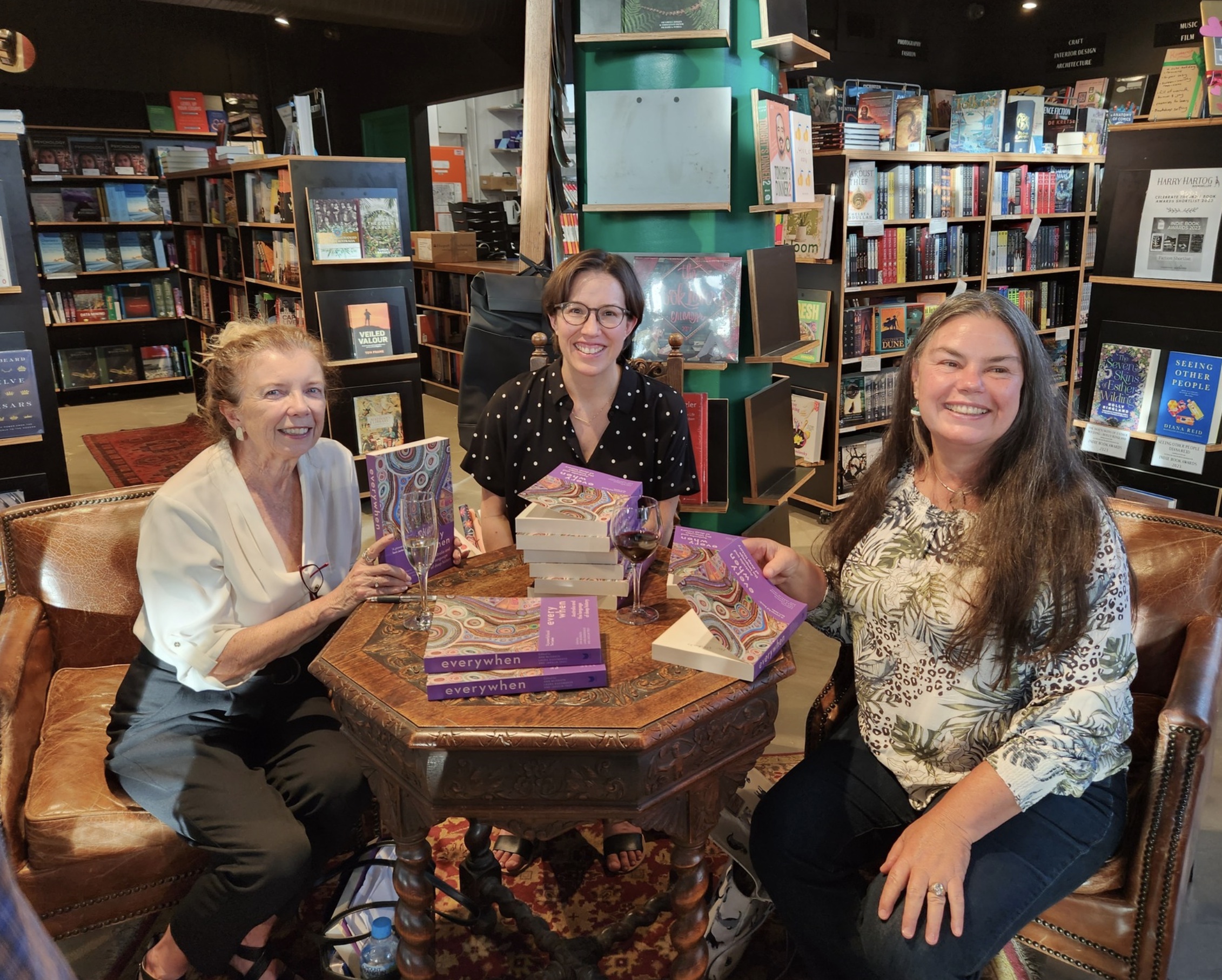
Everywhen: Australia and the Language of Deep History launched at Harry Hartog, ANU
In association with the Academy of Social Sciences in Australia, on 28 February 2023, the RCDH hosted the book launch of Everywhen: Australia and the Language of Deep History at Harry Hartog at ANU. Co-edited by Ann McGrath, Laura Rademaker and Jakelin Troy, Everywhen was developed from the first symposium of the ARC Laureate project in 2018. Everywhen was officially launched by John Maynard, with Frank Bongiorno as MC. Also a celebration of Laura Rademaker’s 2021 Paul Bourke Award for Early Career Research from the Academy of the Social Sciences in Australia, the event was well-attended with around seventy people enjoying the festivities. Harry Hartog was very pleased with book sales, with almost 50% of attendees purchasing a copy. Everywhen was developed from the first symposium of the ARC Laureate project held in 2018. The event was supported by the Academy of the Social Sciences in Australia and Harry Hartog ANU.



John Maynard, Frank Bongiorno, Ann McGrath, Jaky Troy and Laura Rademaker. -
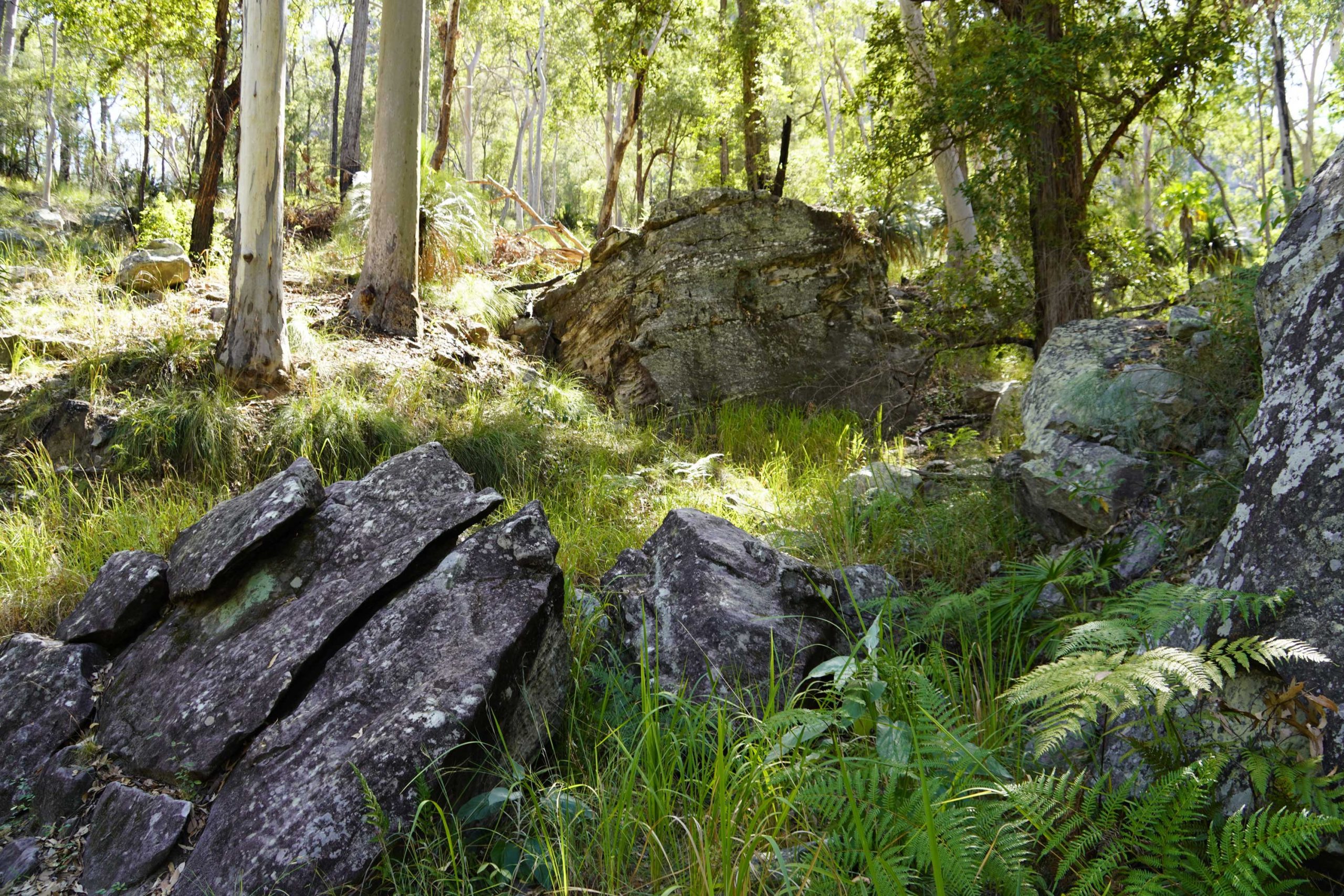
Marking Country Launch and Symposium
When Professor Ann McGrath launched the Research Centre for Deep History in 2019, she spoke of her frustration that historians generally use European discovery narratives to mark the beginning of Australian history. Europeans could not logically ‘discover’ Australia when sovereign people were already living in it. Nor could today’s researchers ‘discover’ deep Indigenous pasts, for it will always be a rediscovery of a lived and ongoing experience.

Since its inception, the Research Centre has expanded the practice of history into deep history. By attending to the specificities of Indigenous knowledges, as well as to the knowledge produced by historians, archaeologists, and anthropologists, the Centre has demonstrated the importance of deep history while also considering its methodological challenges.
Join us as we reflect upon the outcomes of Professor McGrath’s ARC Laureate program Rediscovering the Deep Human Past: Global Networks, Future Opportunities, and the innovative histories it created in partnership with Indigenous communities across Australia and collaborating scholars across the globe.
The Centre is hosting two events to celebrate this outcome and to bring together those who have worked on the project with those interested in and supportive of it.
Launch of Marking Country: A Deep History Digital Mapping Project
5pm – 7pm, Tuesday 22 November AEDT.
In person and online attendance.
Marking Country is a digital mapping project that represents Indigenous deep histories from a number of Countries across Australia. We are thrilled to have ANU Vice-Chancellor Professor Brian P. Schmidt with us to launch Marking Country.
Deep Histories: Reconfiguring Space and Time Symposium
9am – 5pm, Wednesday 23 November AEDT.
In person and online attendance.
This symposium accompanies the launch of the Centre’s collaborative deep history mapping project Marking Country and across four sessions will explore the following:
What useful purpose can deep history play in truth telling? How might Indigenous perspectives shed light on the chronology and temporality of history? And what aspects of the deep history approach might productively expand the history discipline in general?
Panelists include: Professor Ann McGrath, Professor Lynette Russell, Professor Jackie Huggins, Professor Alison Bashford, Professor Daniel Lord Smail, Dr Mike Jones, Dr Laura Rademaker, Dr Ben Silverstein, Dr Amy Way, Neil Brougham and Tabassum Fakier.
Download the full program here.
Both the launch event and symposium will be fully catered.
Register to attend either in person or online here: https://www.eventbrite.com.au/e/marking-country-project-launch-and-symposium-registration-432188797327

